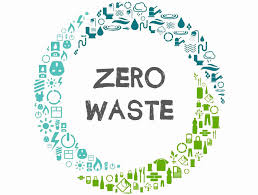As discussed in last week’s article, we have decided to attempt to go zero waste, which is a lifestyle in which one does not produce any trash. Pollution has plagued our seas since the very first industrial revolution, and it continues to do so now. As a result of pollution, there are multiple garbage patches floating in the Pacific Ocean composed of trash, plastics, and other forms of debris. When tasked with looking for ways to eliminate these patches, many people tell themselves; “What am I supposed to do about this? I already recycle, isn’t that enough?” The answer is: no, it isn’t enough, but it is a step in the right direction. People who are zero waste are able to buy products that they will either reuse or compost when done using. Since some of our recycled objects still end up in the ocean, they try to avoid recycling unless necessary. It seems impossible to produce absolutely zero trash, so we have decided to try this lifestyle out on our own.
For the past week, we have been collecting and taking notes on the trash we produced. We only counted trash that we produced, not our entire families, since that would get very messy very quickly. I, Miranda, collected a total of 37 pieces of trash, six gum wrappers, five tea bag wrappers, seven receipts, three pieces of foam, four dried up highlighters and 12 pieces of small nonrecyclable plastic. I, Olivia, collected a total of 53 pieces of trash. This included nine gum wrappers, 12 tea bag wrappers, 13 receipts, 11 on-the-go-cups, six packages of cafeteria snacks, and two lunch trays.
We quickly noticed that plastics made up a majority of the trash that we produced, with waxed or nonrecyclable paper coming in second. Although we didn’t collect the same amount of trash that the average American produces, which is 4.6 lbs a day, we concluded that it was made up of similar materials.
Plastic is not completely evil; it is useful for many things, but it is polluting the Earth. You don’t have to completely eliminate plastic from your life in order to become environmentally friendly. Instead you can at least try to maintain the level of plastic you use. Next week, we will be attempting to do just this, and we will be going zero waste. We plan on cutting down on plastic by using our own reusable containers and utensils whenever we can, and by always making sure that we are making conscious decisions when it comes to buying things. We will sadly need to quit our gum chewing habits, since there was quite a pile of wrappers piled up by the end of last week. We will also be making sure to drink tea that is loose leaf and comes in reusable containers.
For the next week, both of us will be collecting all of the trash (hopefully there will be none) that we produce, and then we will report back to you in next week’s article. Until then, you too can try going zero waste for a week with us.

